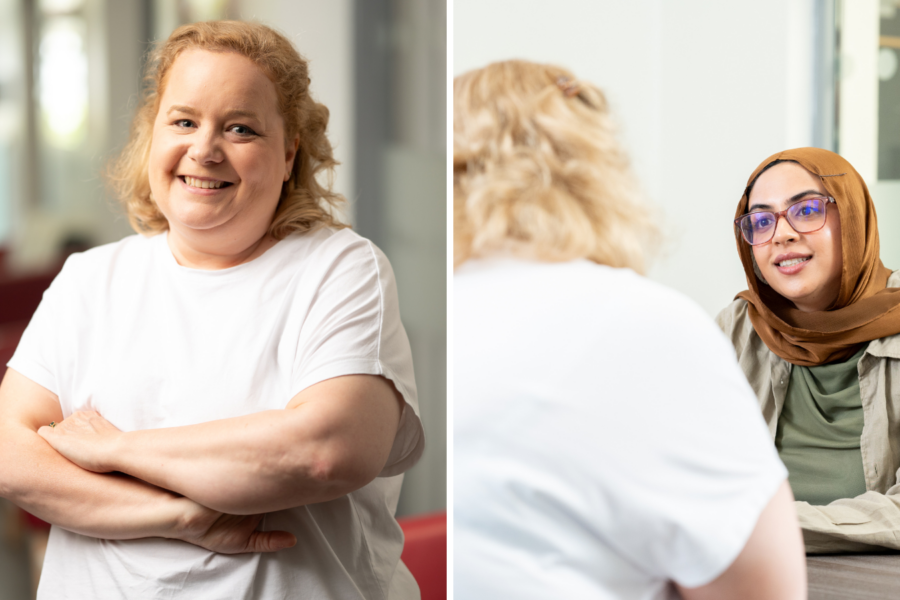
Clinical Research Practitioners (CRPs) make up around a quarter of our research workforce. With fifteen years’ experience of working in research delivery, Maxine Berry – who works in the National Institute for Health and Care Research (NIHR) BioResource team at the Trust – officially became a CRP in June 2024.
CRP is a relatively new umbrella term for the roles in health and care research delivery that have a patient-facing element. It describes professionals who are experts in research delivery: setting up trials, gaining patient consent and delivering research in line with Good Clinical Practice.
“It’s like one day someone woke up and developed the role of a nurse. Today, it’s the turn of clinical research practitioners. It’s a brand-new profession: we can shape it and be at the forefront of what the future looks like,” Maxine says.
After moving from the USA, Maxine’s journey to becoming a CRP took her through healthcare roles in phlebotomy and radiotherapy in Leeds before finding her passion for research.
“There was no direct equivalent of the job I had before so I moved around a bit,” explains Maxine. “Then in 2010, I started in radiotherapy research as a clinical trials assistant.”
A year later, Maxine went to work for the stratified medicine programme – a large cancer sampling study – where she recruited thousands of patients and was the first non-registered staff member at Leeds to run trials, obtain consent and recruit patients for a number of years.
It’s this experience that allowed Maxine to secure a role in NIHR BioResource as the project support manager and team leader in Leeds. Shortly after joining the team, COVID-19 struck and the focus was entirely on supporting the delivery of vaccine trials.
“It was exhausting – in fact I think I’m still tired! But the BioResource team was really helpful for those trials – we went onto the wards recruiting to BioResource, ISARIC and particularly helped the Novovax study,” says Maxine.
Following the pandemic, the role that CRPs can play has gained more and more recognition.
In her time working in research delivery, Maxine has completed a BSc in Health and Community Care and she is currently undertaking a course in Leading Clinical Research Delivery – learning the skills needed to become a Principal Investigator (PI). She would like to undertake a Masters Program after completing the course and one day hopes to earn a PHD.
Whilst she may have more or less found research by accident, Maxine’s drive and passion to make a difference through research is clear.
Maxine reflects: “I may have fallen into this and I may have not really had intentions of staying but after I started I realised how amazing research was and what I could actually do to help people. I feel like I make more of a difference in this role than I ever could elsewhere.”
“I don’t want to treat people – I want to stop it from happening. I want to prevent these illnesses and to be on the ground floor of these new inventions.”
Unlike most other health and care professionals – where research is added to healthcare expertise – a CRP comes to research through being an expert in the set-up, the ethics, the delivery of trials.
“As a CRP you are an expert in research – a research professional. You’re not a nurse, you’re not the expert in patient care but you bring the research expertise and that means healthcare professionals can focus on clinical care,” Maxine explains.
“You can make such a positive difference to someone’s life and you can change the way the NHS works. It’s not just improving things for the patient: it is cost saving; improving treatments for the future. There is so much in research and you can get involved in all of this.”
So what would Maxine’s top tips be for someone starting out as a CRP?
“Gaining the relevant training and experience and use your clinical educators,” says Maxine
“Build relationships with colleagues, learn from them, and take time to learn about other roles in research to help enhance your knowledge of research delivery.”
Maxine also recommends having a mentor or buddy who is a CRP to help you develop.
And the future for this new profession?
“It’s exciting. We’re a whole new group of registered professionals who can deliver research ethically, responsibility and in line with Good Clinical Practice,” Maxine summarises.
“It is a huge opportunity, which will help instil public confidence in research and allow clinical staff to focus on delivering where their expertise is needed.”
If you are interested in being a CRP, you can visit the NIHR website for more information.